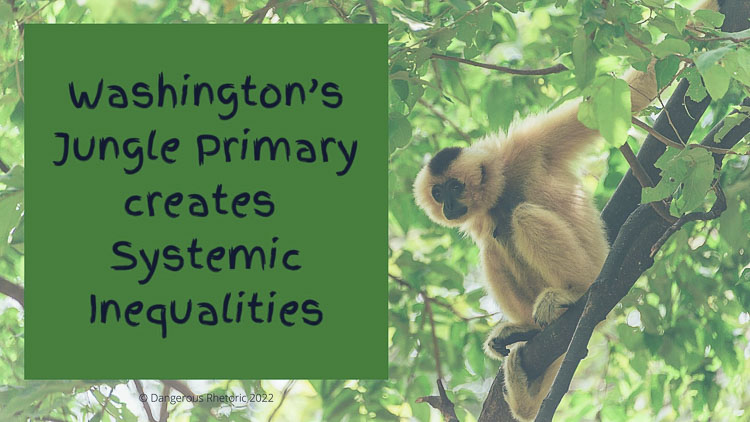
Nancy Churchill discusses the dynamics present in Washington state, where Democratic population density is highest in the major metro areas while rural Washington is mostly conservative
Nancy Churchill
Dangerous Rhetoric
In Washington state, Republicans have a history of losing elections, often snatching defeat from the jaws of victory. Why does this happen?
One reason is that Democratic population density is highest in the major metro areas, while rural Washington is mostly conservative. Conservatives need to fight harder to win the war of ideas in the metro areas. This year, the tide is turning: Increasing gas taxes, inflation, housing policies that increase the cost of housing, public safety and education are all important issues in the 2022 elections.
There are also multiple flaws in our election laws that create systemic bias during elections. Universal mail-in voting, ballot drop boxes, limited access for election observers, vulnerabilities in the counting equipment, the signature verification process and motor voter registration systems are just the highlights. But the biggest systemic problem in our election system is Washington’s Jungle Primary.
What’s the Jungle Primary?
The Jungle Primary was implemented in Washington state for the first time in 2004. Under this system, the voter does not declare a party affiliation and may vote for any candidate in each race, regardless of the candidate’s party preference. The top two candidates in each race advance to the general election, regardless of party preference.
The voters believed this approach was a way to focus on the individuals rather than political parties. In practice, it turns out that the top two candidates are often two of the same political party. This disenfranchises the political group that loses the primary — they have no candidate representing them in the general election.
The problem of vote dilution
One systemic problem is that the political parties have no say over who claims to be affiliated with them. The system also allows an unlimited number of candidates who can file to run in a race. The result is that many candidates of various “flavors” are in the primary, which confuses voters. If your party has five people in the primary, who do you choose?
As a county Republican committee precinct officer, the complaint I hear the most is that “the party” should “do something”. Unfortunately, the power of the Republican party to choose high quality conservative candidates has been eliminated by the US Supreme Court!
If there are many Republicans in a race, the conservative vote is diluted — split among many candidates, rather than focused on one great candidate. When that happens, it’s easy for Democrats to walk away with the top two spots. The result is that in the general election, the conservative voters are disenfranchised and unrepresented.
How can Republicans win?
Republicans will be more successful if we can develop candidate discipline and a grassroots commitment to supporting Republicans who have a broad base of support. To win elections in today’s Washington, we need smart conservative candidates who can appeal to MAGA voters, but also to moderates, libertarians, and walk-away Democrats. We need to build Reagan’s big-tent coalition by proposing common-sense solutions to working-class, kitchen-table problems.
In order to win in the current system, we need Republicans to be willing to pledge to build support around one strong candidate. That’s currently happening in the U.S. Senate race with Tiffany Smiley, who has been running a very strong campaign against Senator Patty Murray for more than a year.
Voters can learn to play the game
Even though the election system has many problems, I believe massive conservative turnout AND speaking to kitchen-table issues can overcome that problem. We must be willing to talk politics with everyone to overcome the existing systemic election inequities. Study the issues and be knowledgeable about them so you can have conversations — in line at the grocery, at the water cooler, or at the gas pump!
Commentator Dan Bongino often says “Republicans may not be the solution to the problem, but Progressives are definitely the CAUSE of your problems.” Strong conservative candidates are offering common sense solutions for public safety, high taxes, lack of affordable housing, the drug crisis, parents rights, and emergency powers reform. We can only implement these solutions with a majority in both houses of the Washington legislature.
Take the time to attend meet-and-greet events, shake hands and look candidates in the eye. Ask lots of questions and trust your instincts. Most people are great judges of character if they interact with candidates face-to-face. Make an early choice, and then help campaign for someone in the primary who will really work to solve problems you care about and who has a broad appeal to many in your community.
Remember, only two candidates will advance to the general election. It’s up to “We the People” to work hard to make sure that at least one of them is a conservative willing to fight to make America great again.
Nancy Churchill is the state committeewoman for the Ferry County Republican Party. She may be reached at DangerousRhetoric@pm.me. The opinions expressed in Dangerous Rhetoric are her own.




